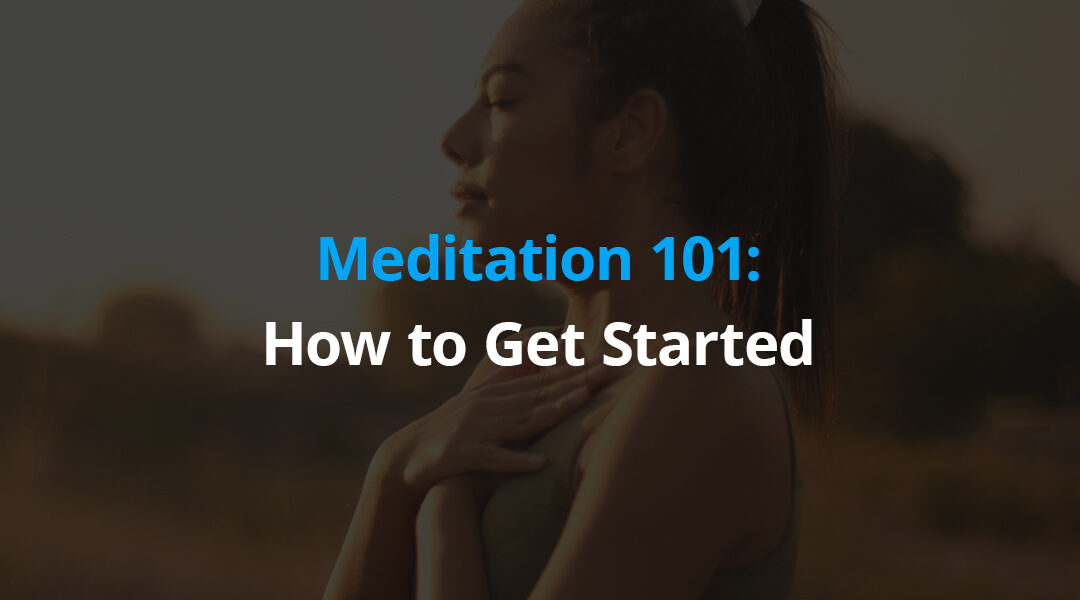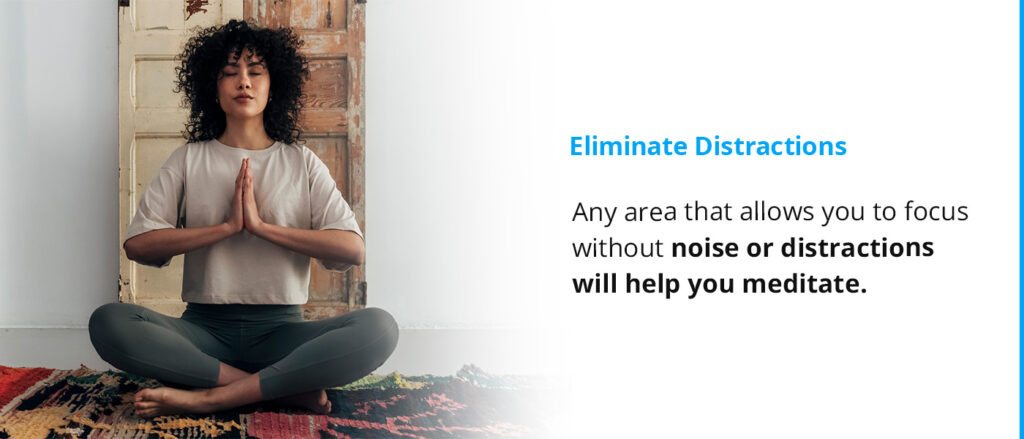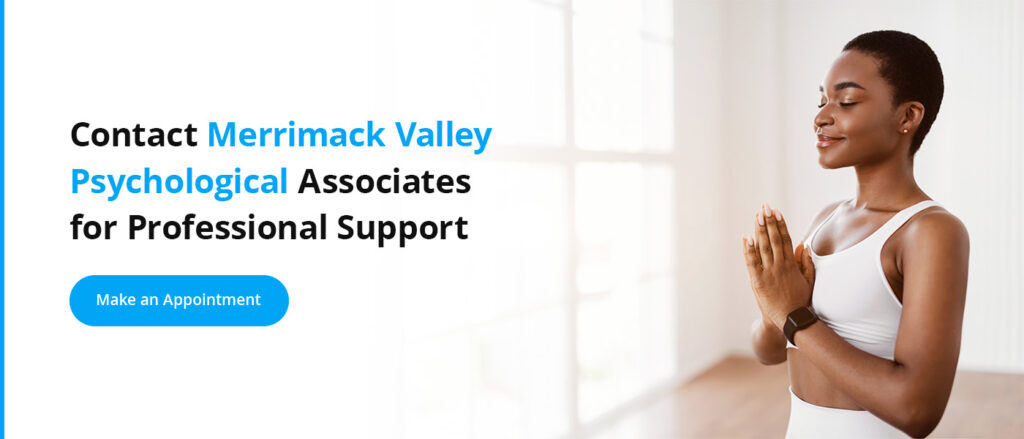Meditation offers incredible benefits for the mind and body. It helps people reach a relaxed state where they feel calm and present and can lower blood pressure while reducing feelings of stress, anxiety and depression. If you are wondering how to start meditation, you can use this guide to help you get started.
What’s the History of Meditation?
While meditation originates from Buddhist traditions, it also has connections to Hinduism, Judaism, Sikhism and Jainism. Over time it has been secularized and adapted to western society, and doctors have found that it has beneficial medical and health effects.
Why Is Meditation Recommended?
Meditation can help reduce symptoms of depression, anxiety and chronic pain by altering how the brain reacts to common stressors. Practicing meditation allows you to teach your brain how to maintain prolonged focus. You can use that focus as a coping mechanism whenever you experience uncomfortable physical sensations or negative thoughts or emotions. As a result, your stress levels decrease. Meditation may also help reduce blood pressure and reduce the symptoms of the following conditions:
- Insomnia
- Irritable bowel syndrome (IBS)
- Ulcerative colitis
- Illness
- Smoking cessation
- Inflammation
- Various psychological conditions
For those with inflammation, IBS or ulcerative colitis, meditation might ease the stress and anxiety that can cause these conditions to flare up, thereby reducing overall symptoms. Meditation may also decrease pain severity associated with cancer treatments and chronic diseases, even as pain medications become ineffective over time. Mindfulness can even help you feel more connected to yourself, your life and others around you, promoting positive responses such as compassion and kindness.
Who Should Meditate?
Anyone can benefit from meditation’s health benefits. However, it’s especially beneficial for people who experience stress, anxiety and depression. You should try meditation if you would like to feel more relaxed and present.
How to Start a Meditation Practice
When you’re ready to give meditation a try, ensure you have what you need to begin, including:
- A quiet space with few distractions.
- A comfortable, intentional posture such as sitting, walking or lying down.
- Words, a phrase, an object or a breathing pattern to focus on.
- An open perspective that allows your thoughts to naturally come and go without judgment.
You’ll also need to choose a method. The various types of meditation all center on the practice of being focused, present and relaxed. When you’re deciding what will work best for you, consider the following:
- Mindfulness meditation: Meditation can help you slow your thoughts and relax your mind and body. In mindfulness meditation, you focus on your senses and on staying in the present moment.
- Breath meditation: Like mindfulness meditation, breath meditation focuses on your breathing and the physical sensation of deep breathing.
- Loving-kindness meditation: Loving-kindness meditation helps you apply gratitude to situations and people in your life. Focusing on yourself and others as you meditate, you practice associating positive statements and thoughts with each person you think of. Practicing gratitude improves your well-being and reduces negative emotions.
- Guided imagery meditation: During guided imagery meditation, you imagine a relaxing scene or event, bringing it to life with details from all five senses. You can use your own imagination or have an instructor, audio recording or video guide you through the process.
- Moving meditation: Whereas other forms of meditation involve a state of stillness, moving meditation focuses your attention through relaxing movements such as tai-chi, yoga or walking.
6 Tips for Starting to Meditate
Whether you want to learn how to start meditation for anxiety and depression, to improve your health or to sleep better, you’ll find that it can be extremely helpful. Here is a five-step guide to meditation to help you begin your journey:
1. Follow a Guided Meditation
Meditation may seem intimidating when you’re first starting, but having a guide can help immensely. To start, search for guided meditation videos or audio clips online. You’re bound to find numerous meditation resources and educational videos to help you through the process, whether your goal is to sleep better, improve your mental health or simply relax after a stressful day.
These audio clips or videos will help you learn from an experienced teacher as they guide you through the basic steps of your meditation practice. They may even teach you how to use these calming techniques in everyday life, making them excellent for beginners.
2. Eliminate Distractions
It’s important to find a meditation space that’s comfortable and free from distractions:
- Find a quiet spot where you can be alone
- Turn off the TV, radio and any other distracting electronics.
- Put your phone on silent mode and place it in an out-of-reach spot or another room.
If you feel most relaxed outside, you can find a comfortable space in your yard or at a state park. Any area that allows you to focus without noise or distractions will help you meditate.
3. Draw Your Attention to Your Body
If you aren’t sure how to begin meditating, that’s okay — the process is simpler than you think! To begin, choose a comfortable position. You can lie on your back, sit in a comfortable upright position or even walk if that helps you focus. Draw your attention to your body by focusing on your breathing. Breathe deeply, noticing how your chest rises and falls with each breath or how the air feels as it moves through your nose.
4. Focus Your Mind
It’s normal for thoughts to pop up as you meditate. When you notice your mind wandering, simply draw your attention back to your breathing. You can also focus on a word, phrase or idea as you meditate to help keep yourself focused.
Guided meditation can help you focus on specific thoughts and ideas such as:
- Practicing compassion.
- Sending positive thoughts to others.
- Tuning into body sensations.
- Focusing on a spiritual belief.
You can download a meditation app on your phone or search for guided meditation videos online to help you work toward specific meditation goals.
5. Observe Your Thoughts and Emotions Without Judgement
As you meditate, practice meeting your thoughts and emotions with awareness. Rather than trying to avoid your thoughts completely, acknowledge them and then gently draw attention back to your breath or the phrase or idea you’re meditating on.
With practice, you’ll learn how to face distracting thoughts and emotions with curiosity rather than judgment or anxiety. Allow yourself to observe them, and then allow them to pass you by as you shift your focus back to your meditation. The goal is to be present, so have patience with yourself and let your thoughts come and go.
6. Develop a Habit
Studies show that practicing daily meditation for eight weeks can enhance mood and memory while decreasing anxiety. Maintaining this habit can help you prolong meditation’s beneficial effects.
Even five minutes of meditation each day can positively impact your mind and body. Try to fit it into your daily routine no matter how much time you can commit to it. You can even take a few moments to meditate at work whenever you feel stressed or overwhelmed.
Contact Merrimack Valley Psychological Associates for Professional Support
Common stressors and life events can cause feelings of anxiety, depression and stress. Meditation is an excellent practice that can help reduce negative emotions, lower blood pressure and improve your overall well-being. If you’re ready to dive deeper into your mental health goals, the compassionate and experienced clinicians at Merrimack Valley Psychological Associates offer various counseling services for a wide range of mental health challenges.
We will help you develop coping skills to manage life’s stressors to feel more relaxed and present. Contact us to learn more about how we can help you achieve your unique mental health goals.



